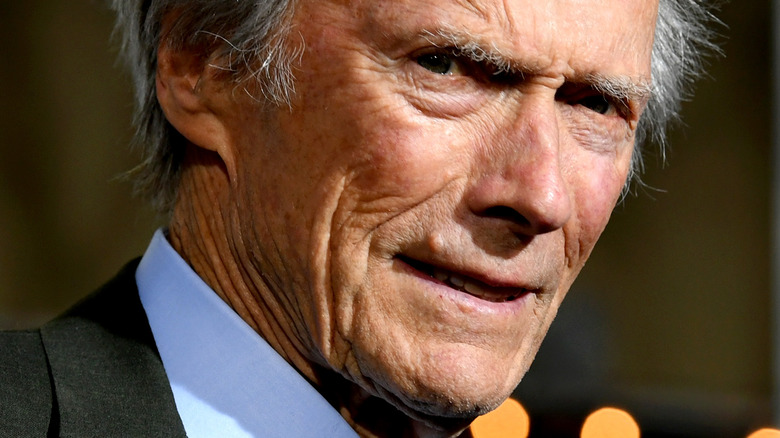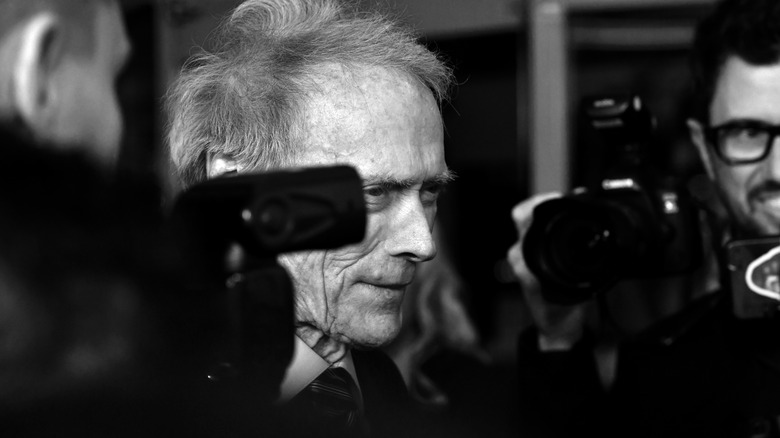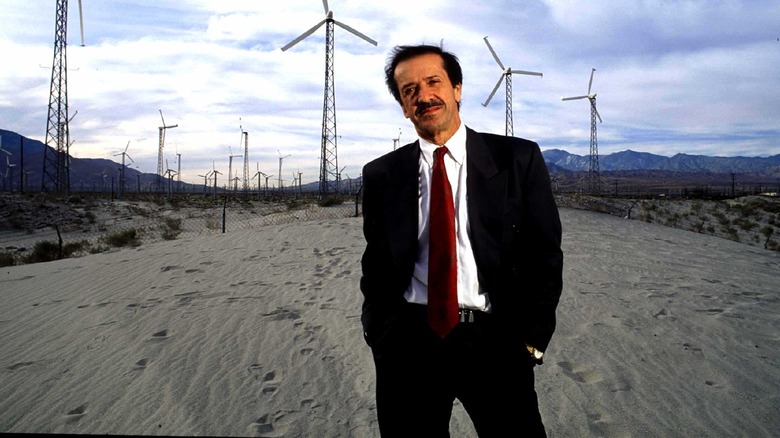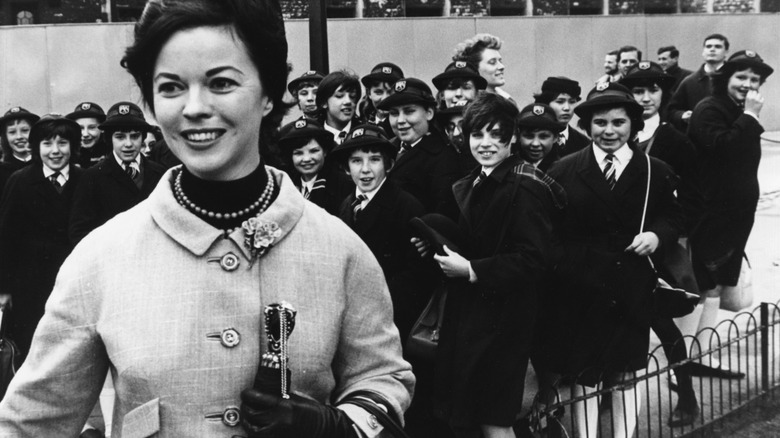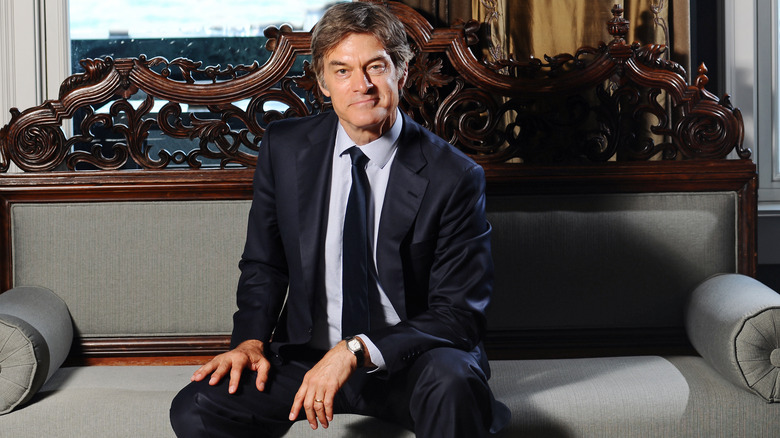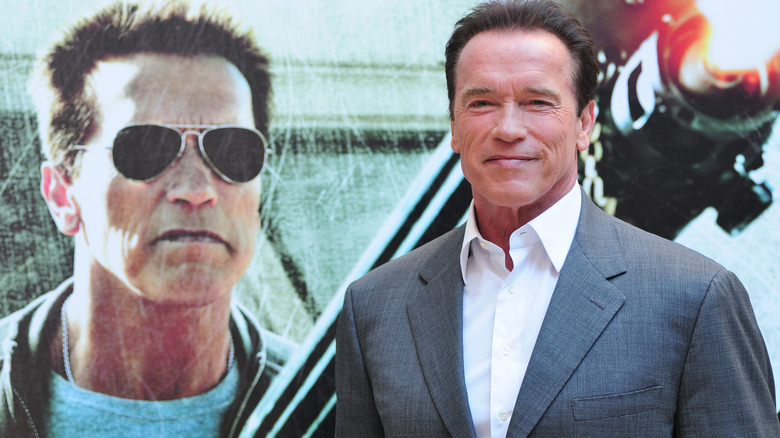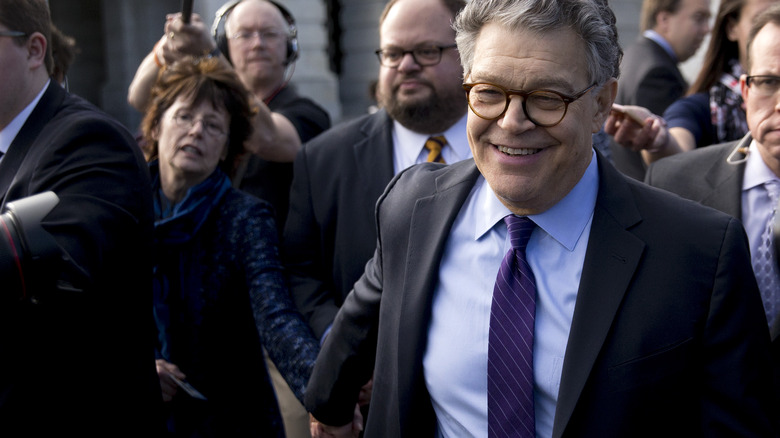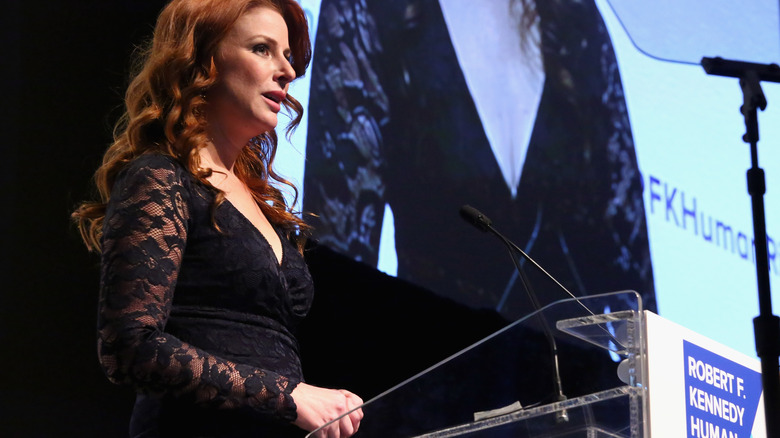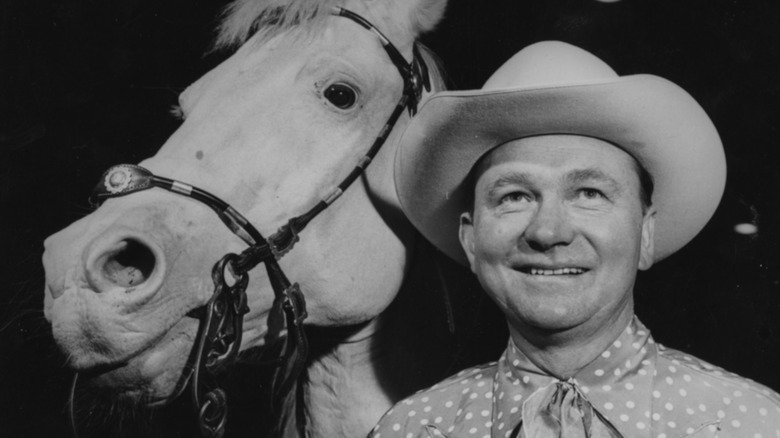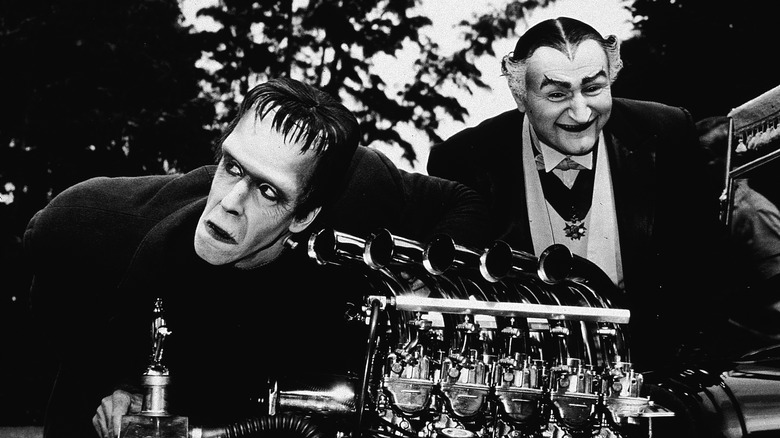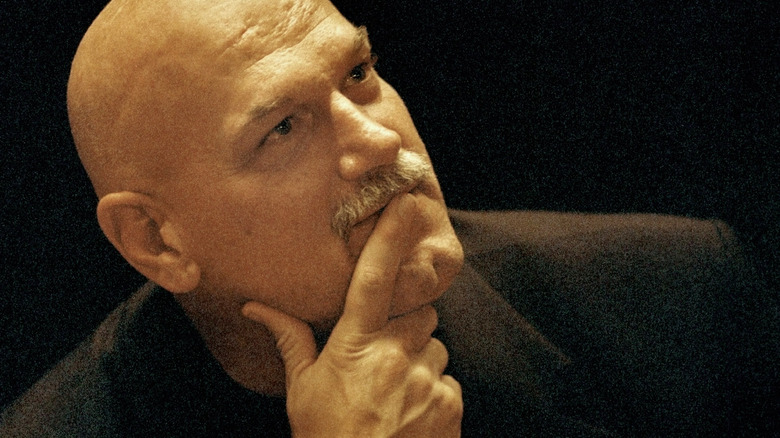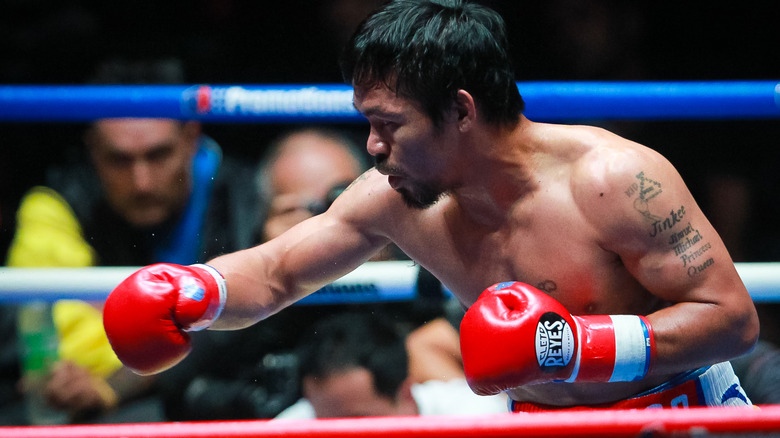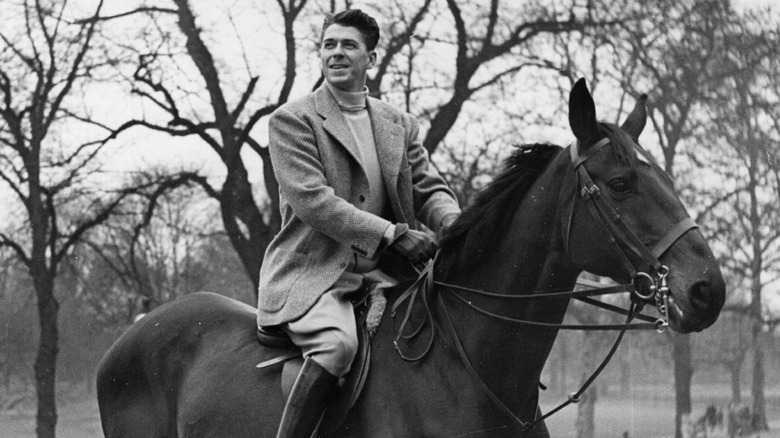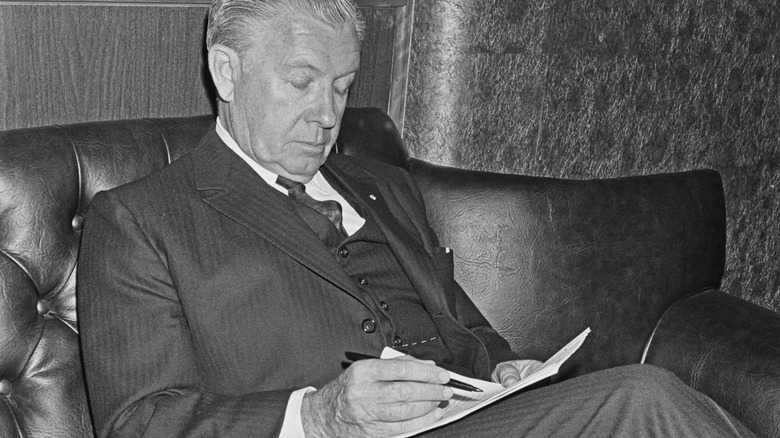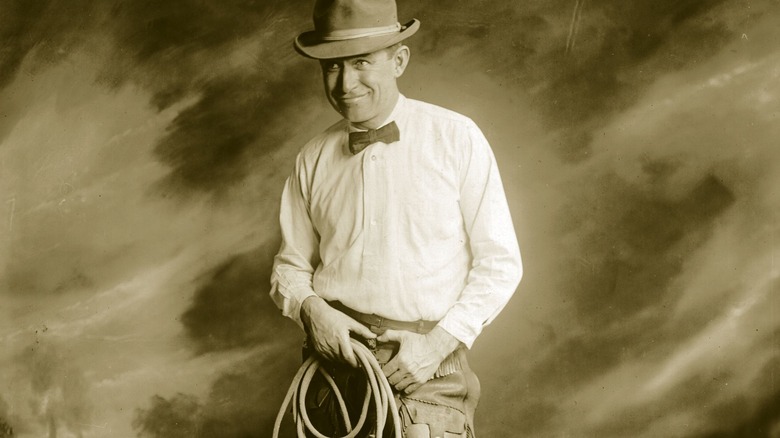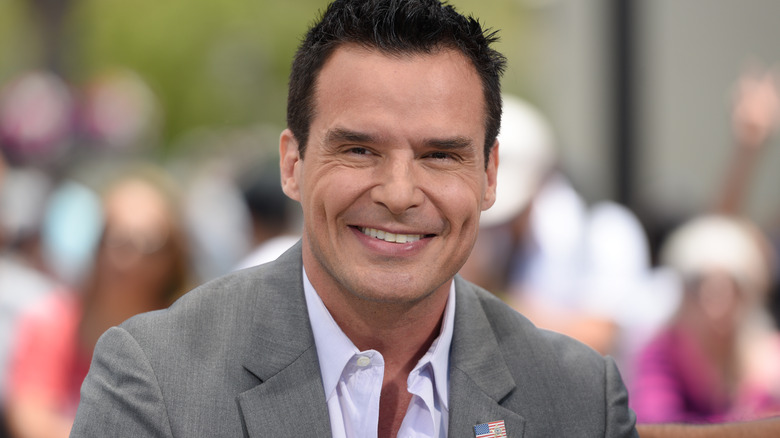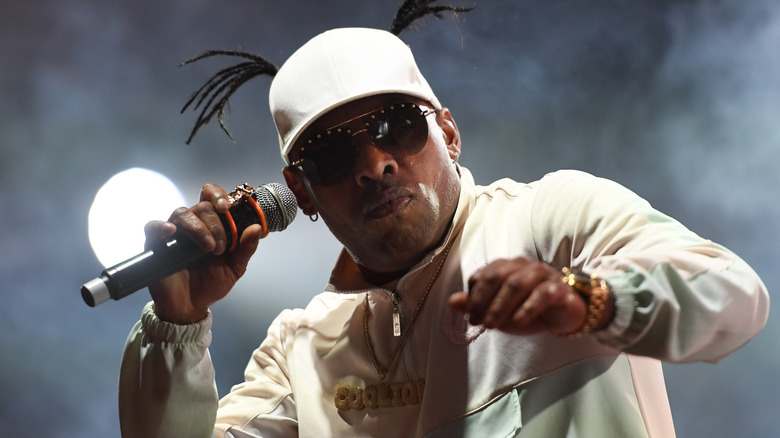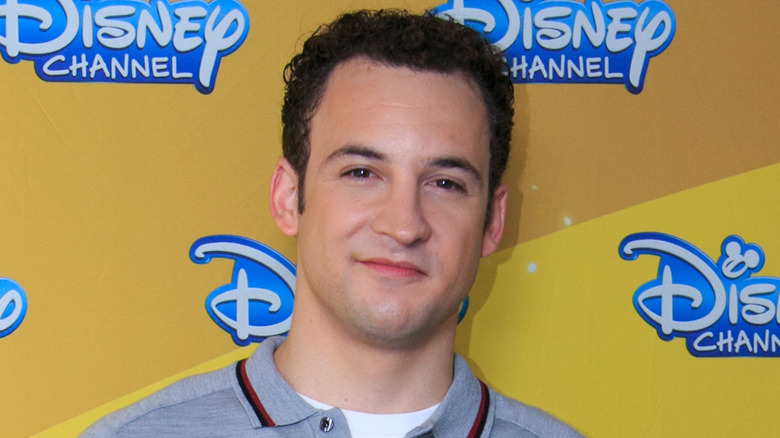Celebrities Who've Run For Public Office
The phenomenon of "celebrity" is a weird one, especially when they start branching out into areas well beyond what they're originally known for. And a political career? That's often well beyond the scope of what made celebrities famous in the first place, but that hasn't stopped a lot of them from giving it the old college try. It kind of makes sense, though: They're often incredibly driven individuals, and as Natasha Lindstaedt of the University of Essex points out (via The Conversation), they're used to navigating the world of media and social media, and they've already got name recognition.
Donald Trump is the most recent example of this. Lindstaedt credits his celebrity for getting him not only a legit and ultimately successful bid for the presidency, but almost $5 billion in free advertising and airtime in the run-up to the 2016 election. There was a certain amount of morbid fascination in wanting to know what the heck was going to happen next, and had the result of blurring the line between "celebrity" and "politician" even more.
But Trump is by no means the only celebrity to make the jump to public office. There's been a ton of celebs who have run for everything from governor and mayor to Congress, and yep, there's even another president on the list, too.
Clay Aiken
Remember when the biggest news story was who got ousted from that week's episode of "American Idol?" Those were the good old days.
Clay Aiken was one of the show's most famous favorites, and here's how The Washington Post explained his North Carolina-based, 2014 run for Congress: He needed way less than the 12 million votes he earned while he was singing his heart out on a national stage. It seemed odd at first glance, but he explained it was Rosie O'Donnell who told him, "We are all just waiting for obscurity, so I should do it while I can. I should do it when I can make a difference. I have this microphone, I should use it."
And unlike other celebrities, Aiken actually had some experience: He travelled throughout Africa with UNICEF, and was on the President's Committee for People with Intellectual Abilities. Still, grabbing the Democratic nomination was a little bit closer than his "American Idol" win, and it turns out that his political career wasn't meant to be. The Hollywood Reporter said that he failed to unseat incumbent House Rep. Renee Ellmers, but that's probably not the last the U.S. has heard of Aiken. When Time asked him if he was going to run again, he responded, "I think it'll happen."
Clint Eastwood
Clint Eastwood might be most famously for meaningful looks given from between a horse and the brim of a cowboy hat, but he's done his share of dabbling in politics as well.
In 1986, Eastwood decided to run for mayor of the city of Carmel-by-the-Sea, California. When he learned that the incumbent mayor had a tendency to spend public meetings knitting, he believed she "had gotten to be too distant," and that something needed to change. (Mental Floss, however, says that at the time, he was more concerned with the city council harassing him over an office building he was putting up on one of his properties, which was within city limits.) Eastwood said that it had been pretty easy to win — he just needed to talk to people, listen, and promise to lift the ban on ice cream cones.
Seriously. Selling ice cream cones had been banned in the city thanks to some 1929 zoning laws, and it was representative of the backwards thinking that he felt was holding the city back. So, he ran, and he didn't just win — The Wall Street Journal says that it wasn't even a close race, and he won by 2,166 votes to 799. He did a lot of good that included growing the local library, expanding accessibility to the beach, and saving a local animal shelter.
Cynthia Nixon
Cynthia Nixon is most well-known for playing Miranda Hobbes on "Sex and the City," and even as the announcement of a revival series hit, it was her character that caused E! To wonder, "What will Miranda's wardrobe entail?" While they gushed about things like "pattern play" — which sounds seriously dirty, but disappointingly isn't — Nixon had other ambitions in real life: Like taking on New York's incumbent governor Andrew Cuomo.
She ran in 2018, and according to The New York Times, her bid to take the Democratic nomination didn't go well. The word "trounced" was used, and even though she netted more than half a million votes, it wasn't anywhere near enough to win. Her campaign advisers suggested that this was a case of her celebrity working against her, as Cuomo's team focused on "Nixon the celebrity" instead of her experience as an activist and education advocate.
There was another problem, too: Thanks to the ascension of Donald Trump, the idea of a celebrity crossing into politics was one that had left a bad taste in the mouths of many, and given that she was going for a Democratic nomination, it's easy to see why many weren't on board. She conceded, tweeting: "While the result tonight wasn't what we had hoped for, I'm not discouraged. I'm inspired. I hope you are too."
Sonny Bono
Sonny Bono was, for a long time, famous for being that guy that performed with Cher. According to History, though, the persona he embodied on-stage masked a shrewd businessman, and after their partnership broke up, Bono — who was already a successful restaurateur — decided to get into politics. He was sick of the challenges put in front of business owners, so he figured if he wanted to change things, he needed to do it from the inside.
In 1988, he ran for and was elected as the mayor of Palm Springs, although the Desert Sun says just a year later, thousands of people signed a petition to have him recalled. The town — which he had described as "real cliquey" — had a core group who wanted him out. There were plenty of people who weren't fans of his term, during which he'd backed down on things like protecting rent controlled apartments, and funded a PR team instead of law enforcement.
The recall wasn't successful, and Bono didn't give up: While his bid for a Senate seat was unsuccessful four years later, he was elected to a Congressional seat in 1994. He was re-elected two years later. There's really no telling how far he would have gone, as he was described as having the sort of personality that could make opposing lawmakers "laugh at themselves." That sentiment was in his obituary, after he was killed in a 1998 skiing accident.
Shirley Temple Black
Mention Shirley Temple's name, and the image that springs to mind is invariably one of a little girl with blond ringlets, who's almost aggressively cheerful. In 1986, she explained the beginning of her career (via Biography): "People in the Depression wanted something to cheer them up, and they fell in love with a dog and a little girl."
That was just part of her story, though, and she retired from show business when she was just 22 years old. After marrying a Navy Lieutenant Commander who was stationed at the Pentagon, she got reacquainted with the political world she'd briefly been introduced to as a child. (She once fired a slingshot at Eleanor Roosevelt.) While she was there, she started to reinvent herself into what she described as a "citizen politician," before finally running for Congress in 1967. USA Today says she was a "Republican-Independent," and if she'd been elected, she would have been California's first female representative. At the time, AP news coverage focused on the "petulant pursing of her lips," while she explained: "I think men are fine and here to stay, but I have a hunch that it wouldn't hurt to have a woman's viewpoint expressed in that delegation of 38 men."
She didn't get elected, but she did secure appointed offices: She was a member of the United Nations' General Assembly in 1969, was an ambassador to Ghana and later to Czechoslovakia, and spent two decades working for the state department.
Dr. Oz
Dr. Oz became famous because of his regular appearances alongside Oprah Winfrey, and was given his own show in 2009. He's wildly controversial: When Steven J. Dell, MD and Chief Medical Editor of "Cataract & Refractive Surgery Today" looked at just what made him so controversial, he cited (via the US National Library of Medicine) a slew of credentials, degrees, education, and appointments to medical chairs, alongside his promotion of things like homeopathy, psychics that can consult with the dead, and iridology, a pseudoscience that claims the entire body can be diagnosed by looking at the eyes.
Then came 2021, the year that surprised no one. Oz explained (via CNN): "During the pandemic, I learned that when you mix politics and medicine, you get politics instead of solutions. That's why I am running for the U.S. Senate: to help fix the problems and help us heal."
His bid for one of Pennsylvania's Senate seats seems to have been a long time in the making, as he's mentioned in interviews going back to 2007 that he had been thinking about running for office at some point. A doctor running for Senate might seem like a no-brainer, but NPR adds that in addition to being outspoken about the government's "mandated policies that caused unnecessary suffering," he's also recommended things like hydroxychloroquine for COVID, a treatment that mainstream organizations like the FDA definitely do not recommend.
Arnold Schwarzenegger
Originally most famous for the sort of movies that spawn catchphrases known across the globe, Arnold Schwarzenegger ran for office way before it was cool for celebrities to do so. He was elected as the governor of California back in 2003, says History — and yes, it was only 2003 in spite of the fact that it feels like he's been a politician for about 500 years. Famously married to JFK's niece, he still opted to hop into the political arena on the other side of the fence. Just like he threw his all into once trying to kill Sarah Connor, he went all-in with the Republicans. It worked: He won by a landslide, beating his nearest opponent with a hefty million-odd votes.
There's an old saying about the higher you climb, the farther you have to fall — and in 2011, LA Mag was reporting that Schwarzenegger was stepping down with one of the lowest approval ratings in the state's history. What happened was complicated, but it involved making promises that tripled the state's debt and ultimately made absolutely no one happy — especially those impacted by deep cuts to funding of services like childcare, rental subsidies for the elderly, and funding for battered women's shelters.
Still, by 2021, he was what The New York Times referred to as an "elderly statesman," holding court in his home as he promoted safety measures and vaccinations in the face of COVID.
Al Franken
Al Franken's rise and ultimate fall is a weird story, and considering there was a time when he was only known as a comedian and cast member of "Saturday Night Live," it's both surprising and not surprising that it was a bawdy piece of sci-fi written in 2000 that caused him some serious grief.
According to The Washington Post, the short story of questionable content was written for "Playboy," and when Republicans started condemning him for it — just before the Democrats confirmed him as their 2008 Senate nominee for Minnesota — pointing out that writing that sort of thing had been his job didn't go over well. And when digging dragged up even more violently misogynistic writing, it's pretty incredible that he was able to do enough damage control to not just save his career but win the Senate seat anyway.
He later said he wasn't the least bit sorry he'd pitched icky content up to and including rape jokes, and that it had been his job. Then, he was apologizing again — without admitting guilt — when eight women came forward in 2006 to accuse him of sexual misconduct. He resigned in front of the Senate shortly after the allegations broke, and according to The New York Times, many were unhappy with his apparent refusal to address the issues and responsibilities that came with that.
Diane Neal
"Law & Order" has been on the air for an almost unthinkable amount of time, with countless people popping up and getting their foot in the door. One of the regulars from 2001 to 2012 was Diane Neal, more popularly known as Assistant DA Casey Novak. After appearing on some similar shows post-"Law & Order," she announced in 2015 (via USA Today) that she was going real-world with a different branch of the government. She was going to be running for a Congressional seat, based in upstate New York.
She spoke with Elle about her reasons for running and the challenges she faced, and one of the biggest came when she suggested that being "condescending or judgmental toward people of a different view [just made] them dig deeper as opposed to being open to your point of view." The backlash was real, she said, and so she decided it was best to remain independent. At the time, she was living in upstate New York — an area she called "neglected" — and recovering from a car accident that left her with a fractured spine and a determination to run for an office where she could make a difference.
The Hollywood Reporter says that her goals were short-lived: After nearly 2,000 signatures on her nominating petition were "rejected," she was denied the nomination, but said she would run again.
Tex Ritter
Tex Ritter might not be a household name these days, but back in the era of the singing cowboys, he was the go-to guy. The Country Music Hall of Fame Museum puts him alongside other famous names like Roy Rogers and Gene Autry, and not only did he record songs for some of the biggest films of the 1950s, he also helped found the Country Music Association.
In other words? You'd better believe that Grandma thought he was just the bee's knees.
Then, in 1970, The New York Times said that the man called "America's most beloved cowboy" decided to run for a Tennessee Senate seat. He went Republican, and took aim at the incumbent Albert Gore — who was widely being condemned for being just too liberal to represent the state. The Grand Ole Opry star did, of course, sing while he was on the campaign trail, but it didn't work. According to Stars and Stripes, he was "dry-gulched," and in non-cowboy speak, that means he lost. The then-64-year-old said that he'd done it just to give people a choice, and added that as far as politics went, he was hanging up his spurs.
Al Lewis
Every decade has their pop culture icons, and according to NPR, one of those icons from the 1960s was Al Lewis. Modern-day youngsters might not recognize the name, but they should — hopefully — recognize him in costume: he was Grandpa Munster.
He was so well-known as Grandpa Munster that when he ran for New York State governor in 2000, he went to court in an attempt to make it completely legal to have his name written on the ballots as "Grandpa Al Lewis." He failed in that attempt, but according to The New York Times, that didn't stop him from dressing as his alter ego for his campaign appearances.
Unfortunately for Grandpa, he also failed in his bid to become governor. He only netted 52,000 votes, but it's entirely possible that it was a case of, "Wrong place, wrong time." His political stance would, today, be much more popular: A member of the Green Party, he campaigned against companies being allowed to dump waste in the nation's waterways, and absolutes in the legal system, especially when it came to drug convictions and the death penalty. In the "for" category? Affordable housing, clean air and water, and community gardens.
Jesse Ventura
MPR calls it "one of the most remarkable moments in Minnesota's political history," and that's the election of pro wrestler Jesse Ventura to the office of the state's governor. This was also back in 1998, when the very idea that a pro wrestler might have political aspirations was beyond weird. As History says, Ventura wasn't just a pro wrestler, but he was also the bad guy that came with tie-dyed clothes and lots — and lots — of trash talking. His go-to saying was, of course, "Win if you can, lose if you must, but always cheat." An unlikely candidate for office? Sure, but little did the world know back in the simpler time that was the late 90s, things were going to get even weirder.
Ventura promised that if he was elected, he was going to do some real good in the state. In all fairness, he did — like kick-starting the Minneapolis/St. Paul light rail system. While he was governor, he also did things like becoming an analyst for the XFL and guest starring on a soap opera, so he wasn't entirely a normal politician even after getting into office.
Things started going sideways with Minnesota's finances, and Ventura decided to end on a high note. He didn't run for a second term, and MPR says he left with this: "And I just say to the people of Minnesota: 'Thank you, it was my pleasure.'"
Manny Pacquiao
Manny Pacquiao isn't just a boxer, he's a boxer who has been in the center of the ring for some of the biggest fights in the sport's history. In 2015, Forbes says his head-to-head match against Floyd Mayweather became the best-selling fight in boxing history, with 4.6 million pay-per-view tickets sold. Being an athlete is a full-time job, but in 2010 — a political race that Al Jazeera notes was his second try — he was elected to Congress in the Philippines.
From there, he's continued to climb through the ranks of the government. Elected to the Senate in 2016, he netted a whopping 16 million votes. NPR says that while at the time, he declined to comment on future political ambitions, they did note that by the time the next presidential election rolled around, he would be old enough to run.
And sure enough, they were right. In 2021, CNN reported that Pacquiao had not only confirmed his candidacy for president, he also promised that he was going to investigate former allies — both his own and those of outgoing president Rodrigo Duterte — and that he was going to campaign from a stance pushing anti-corruption, economic growth, and noted that he was backing away from the previously-hardline stance on drugs. Simply put, he said: "I want to give Filipinos a good life, a good future. That is my goal, that's why I entered politics."
Ronald Reagan
When Donald Trump announced he was going to be running for president, NYMag says that there were a ton of parallels drawn between him and another man who was much, much more famous for a career outside of politics before setting his sights on the White House. That, of course, was Ronald Reagan. Similarities and differences aside, it's undeniable that Reagan's journey to the U.S. presidency was a fascinating one. It started when he was president of a different organization: the Screen Actors Guild. It was there that he was front and center as rumors of supposed Communist supporters in Hollywood caused some serious havoc throughout the film industry, and Reagan came out on the conservative side.
Perhaps unsurprisingly, he got a lot of grief for wanting to run for office. History says some of that even came from the film studios that joked about how he wasn't leading man material — Jack Warner of Warner Bros. reportedly had this to say when he found out Reagan was running for governor of California: "No, Jimmy Stewart for governor, Ronald Reagan for best friend."
Still, with help from a starring role in some World War II films that helped up his street cred, Reagan was elected as California governor in 1966 and again in 1970. From there, it was up and into the White House.
George Murphy
Here's a neat bit of trivia: Ronald Reagan made his way into the world of politics after being president of the Screen Actors Guild, and his predecessor in that position did the exact same thing. Before Reagan, it was George Murphy who was SAG president, and at the time — in the 1940s — he was a huge deal. He was a tap-dancing actor who had starring roles with everyone who was anyone, from Shirley Temple to Fred Astaire.
It was President Dwight D. Eisenhower who had Murphy oversee the entertainment for his inauguration, and according to Mental Floss, that's kind of what got him interested in politics. In 1964, he successfully won a U.S. Senate seat in California, but he would only be there for a single term. There was a small scandal that didn't help his reputation, but that didn't cut his political career short. Diagnosed with throat cancer halfway through his first term, the surgery that saved his life left him unable to speak above a whisper.
Still, one of his contributions to Senate life remains a tradition today. That's the candy desk, a desk that remains stocked with all kinds of sweets and treats — and it's all thanks to the only Senator who had both a star on the Hollywood Walk of Fame and an Oscar.
Glenn Jacobs
TalkSport calls the saga of The Undertaker and Kane "one of the best WWE has ever done," and some seriously high praise for an industry filled with flashy tales. The man behind Kane's mask was Glenn Jacobs, and Jacobs? His appearances in the ring became fewer and farther between, and then, in 2016, he announced that he was going to be running for mayor in Knox County, Tennessee.
ESPN reported that while he had barely won in the primary election, the long-time WWE star had swept the final 2018 election and secured about two-thirds of the votes cast. (And yes — The Undertaker helped him on the campaign trail.)
In 2020, Deseret News was reporting that he was facing a challenge completely unlike anything he'd ever faced in the ring: COVID. At the time, he was mourning the economic loss over the loss of life — saying, "That's not to discount the people who have lost loved ones. I just think the wide-scale economic pain is what's going to impact folks the most, unfortunately." A year later, he was still being very, very outspoken, writing a letter to U.S. President Joe Biden to say (via CBS) that he was putting his foot down, and refusing to follow new vaccine mandates.
Will Rogers
Will Rogers was one of the nation's biggest stars of the 1920s, and when "moving pictures" became a thing, he made the jump from vaudeville to movies. He was a comedian who ran in syndication in hundreds of newspapers and on radio stations across the country, and according to the Motion Picture Pioneers Foundation, he also could have been president.
Kind of. In 1928, Rogers announced his candidacy for president with help from Life magazine. The entire stunt was done to pretty much prove that the whole idea of campaigning was "bunk," so to really get the point across, he ran as "the 'bunkless candidate' of the Anti-Bunk Party." He informed the nation (via The Nation) that he was in favor of things like "Art, Industry, and Sport," and promised that "No matter what's on our platform now, on November 6, we will have a bonfire and burn the platform." He also promised that if he won, he would resign immediately: So, on election day, he declared that he had officially won and that he was immediately resigning.
That wasn't his only foray into politics, though — according to Patch, he was also made "Honorary Mayor" of Beverly Hills in 1926.
Antonio Sabato Jr
Antonio Sabato Jr. is most familiar to people who like a certain sort of entertainment — namely, dramas and soap operas. The star of "Melrose Place," daytime soaps like "General Hospital," and scores of ads for Calvin Klein made a massive leap from his norm in 2018. That's when he announced that he was going to be running for a seat in the House of Representatives, taking on a Democratic incumbent in California.
He was pretty vocal about the sort of things he was going to support, too, saying (via ABC News) that he was a huge fan of both the second amendment and Trump's proposed border wall. He also lauded Trump for inspiring him to run in the first place, but he also claimed his association with the mogul-turned-president hasn't always worked out well for him. Sabato told Variety that when he came out hard in support of a pre-president Trump, "I was blacklisted. All my representatives left me, from agents to managers to commercial agents. I literally had to move, find a new job to survive and take care of my kids. It's been terrible. It's mind-blowing."
That conversation came two years after his run for Congress: which ended in defeat and a re-election for the Democratic representative already in Washington, D.C. At the time he gave the interview, he was living in Florida and working in the construction industry as a supervisor.
Coolio and Cherie DeVille
There's no denying that the election of mogul and reality TV personality Donald Trump to what's arguably the most powerful political position in the world opened up a whole new set of possibilities for the American government ... along with a bit of cynicism, because when The San Diego Union-Tribune announced that a rapper-porn star team had thrown their hats in the ring for 2020, nothing was really going to surprise a world-weary nation at that point.
The rapper was Coolio — of the "Gangsta's Paradise" fame, and the porn star was Cherie DeVille — of "Hot Tub Hottie" fame. Surprisingly — and, at the same time, not surprisingly — the duo leaned heavily on her credentials, which included "an impressive educational background," and being "a woman who has never let anything stop her, thriving in a male dominated industry to reach the very top."
After repeatedly reassuring literally everyone who asked that yes, they were really, truly, honestly serious about running for president, The Hill reports that they backed out. DeVille claimed there were a few things that had stymied their plans including a lack of funds, the number of threats she'd received, and the damaging impact of the headlines captured by another famous porn star, Stormy Daniels. DeVille explained, "I wonder if that hurt the legitimacy of my campaign, as if, 'Oh, there's another porn girl trying to get in the political sphere.'"
Ben Savage
After appearing alongside his older brother, "The Wonder Years" star Fred Savage, in "Little Monsters," Ben Savage became a tween and teen sensation in his own right. From 1993 to 2000, he played rambunctious kid turned thoughtful young adult Cory Matthews on the ABC sitcom "Boy Meets World." He'd reprise the role for the 2014 to 2017 Disney Channel sequel series "Girl Meets World" as the father of the central character.
In between, Ben Savage delved into politics. While working toward a degree in political science at Stanford University, Savage landed an internship in the Washington, D.C. office of Pennsylvania senator Arlen Specter.
Two decades later, Savage began his first campaign for elected office. In 2022, he ran for a seat on the city council in his home of West Hollywood, California. He lost the election, according to the Los Angeles County Registrar-Recorder, finishing in sixth place with 6.32% of the vote. A few months later, Savage threw his hat into another political ring. In 2023, according to NPR, the actor declared his candidacy for the U.S. House of Representatives. The seat serving California's 30th congressional district was long held by Rep. Adam Schiff, but he announced he is running for an open Senate seat in 2024. Savage is running as a Democrat.
